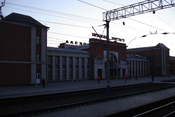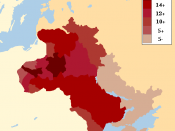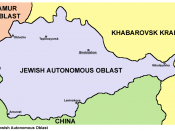BIROBIDZHAN: THE FAILED SOVIET JEWISH AUTONOMOUS REGION With the annexation of Polish territory to Russia between the years 1772 to 1815, Jews would become for the first time, a formal minority within Russia (1). Suffering from constant persecutions and pogroms during the years of the Tsarist governments, the majority of Jews were not allowed to live within most major cultural and industrial centers (2). Confined within an area roughly the size of modern day Belarus and the Ukraine, over 90% of Russia's five million Jews were forced to live within the area known as the "Pale of Settlement" (3). It is of little surprise then that with the Bolshevik's rise to power in 1917, many Jews within Russia looked upon the change with optimism and hopefulness. Prominent Jews in the first Council of Commissars, men such as Trotsky, Zinoviev and Kamenev were seen as inspirational leaders for the Jewish population (4).
The Bolsheviks talked of a commitment to the rights of national minorities, and cultural diversity was seen as accepted as long as it was socialist in content (5). The sense of hope that surrounded the Bolshevik government during 1917 within the Jewish population, quickly passed with the impending civil war, which would last until 1921. Few Russian Jews were not to be affected by the war, massive pogroms in the Ukraine alone left over 200,000 dead (6). By 1921 the overwhelming poverty of the Jewish population forced the Soviet government to take action. The "normalization" of the Jewish population was proposed in a response to further integrate Jews into the socialist economy and society. Jews involved in commerce and retail had been economically ruined by the civil war, and it was believed that agricultural resettlement was the best option available to reintegrate Jews into Soviet society (7). From 1924 on, the pace accelerated quickly to resettle the Jews through agriculture. Fruition was to be seen on March 28th/1928 when the area of Birobidzhan in the eastern USSR, was declared to be the Jewish Autonomous District (8). The plans for the region were exemplified in 1926 by the Soviet president Mikhail Kalinin as he declared " the Jewish population must be transformed into an economically stable, agriculturally compact groupâ¦Only under such conditions can the Jewish masses hope for the future existence of their nationality." (9). It will become clear that Kalinin's views would never be achieved in Birobidzhan. Birobidzhan while achieving some success would effectively be ruined by a combination of purges in the region and anti-Semitic measures undertaken both in 1936-1938 and again in 1948.
Decisions and steps leading up to March 1928 with the creation of the Jewish Autonomous District involved a number of organizations and individuals. In late 1924 two organizations were created, OZET (Society for the Settlement of Jewish Toilers on the Land) and KOMZET (Committee for the Settlement of Jewish Toilers on the Land), to further solve the problem of resettling Jews through agriculture (10). Original plans outlined the settlement of over 500,000 Jews in the Ukraine and Crimea by December 1926 (11). The idea of agricultural resettlement of Jews in these areas was rejected for two reasons. Land suitable for agriculture in Crimea was very limited the only land not densely populated was that of the northern steppe-land. These unfavorable agricultural conditions would have forced a major financial investment from the government to make the lands suitable for use (12). More importantly there was widespread jealously among the Ukrainian and Tartar peasants in regards to any incoming Jewish population, anti-Semitism among these groups was also very evident (13). It was after this initial failed attempt at Jewish agricultural settlement that the involved parties looked eastward, towards the area of Birobidzhan.
Named after the major tributaries of the Amur River, the Great Bira in the east and the Bidzhan in the West, the area of Birobidzhan had been annexed to Russia in 1858 (14). Dominated by mountains and forests in the north, swamplands and marshes in the south, Birobidzhan was a relatively uninhabited area in the mid-1920s with a population of only 27,000 in an area larger then Belgium (15). The best evidence available shows that the decision to choose Birobidzhan was made by representatives of the People's Commissariat for Agriculture, experts from the People's Commissariat of Defense, the Russian scientist Vladimir Komarov as well as the Soviet president Mikhail Kalinin (16). Many Jews within the communist party supported the idea; the Commissar for Jewish National Affairs Semyon Dimonshtein sees this support in a quote as he said, "Birobidzhan will become the most important guardian of the Jewish national culture." (17). Although Jewish support was seen, Birobidzhan was never created out of Jewish initiative, and it was openly protested by leading KOMZET members such as Yuri Larin who argued against a harsh climate, unsuitable soil and the fact that Birobidzhan was a considerable distance away from any major Jewish population (18). Proponents of Birobidzhan seem to have chosen the area for a number of reasons, and any opposition to the plan was silenced. Settlement of Jews in the area seems to have been done not only because the settlers were to be Jewish but simply just to get any population in the eastern Soviet Union. The reasons behind a desire to populate the east, was the fear of Japanese expansion into the area (19). Logistical problems in the Russo-Japanese war had convinced the government of the need to create an agricultural and industrial center in the east (20). Along with populating the east and solving the problem of Russian Jewry's poverty, there also is evidence that it was hoped the creation of Birobidzhan would divert attention away from Zionism. Along with populating the east and solving the problem of Russian Jewry's poverty, there also is evidence that it was hoped the creation of Birobidzhan would divert attention away from Zionism (21). Opposition to Zionism, mainly those supporters of Birobidzhan argued that the offering of economic stability through agricultural work and the preservation of the Jewish culture in the Soviet east made it the more desirable option (22). When on March 28th/1928 the Presidium of the USSR Central Executive Committee allocated the region of Birobidzhan for settlement of Jewish agricultural toilers the final step had been taken in the creation of the area (23). It is at this time when the decisions to choose Birobidzhan as the Jewish Autonomous Region, that future problems for the region itself were to be created. Multiple interests in the area, created no cohesiveness in goals for Birobidzhan, and a lack of unity in the decision making between the government and the Jewish population itself would make it very difficult in the future for the region to satisfy everybody's needs. Nonetheless, it was hoped that a homeland for Soviet Jews would develop a Yiddish culture rooted in socialist principals (24).
The early years of settling Jews in Birobidzhan had relatively little success in attracting any population to the area despite strong government incentives. Interested migrants and their families were offered almost completely free travel and food subsidies (25). Early problems with settlers in the years 1928-1929 was, a result of the inability of the government to properly prepare the incoming population most of whom had no agricultural experience of the challenges ahead. Supplies were also in these early years, drastically not available. Land given was often found to be unsuitable for cultivation because it had not been drained, basic necessities like water; barns, livestock and tools were frequently nonexistent (26). By the fall of 1929 conditions had deteriorated so quickly that the majority of settlers were concentrating around Tikhonkaya Station, the major railway stop, and not even on the land (27). An American observer to Tikhonkaya in 1929 remarked, "they live in barracks. In an incredibly crowded and dirty placeâ¦no land has been prepared for settlementâ¦some live in extreme poverty." (28). The result of these early hardships is that of the 2825 settlers that arrived in these first two years, only 1200 would remain at the end of 1929 (29). It was becoming clear in these early years of Birobidzhan that none of the objectives for the area were yet to be realized; these early years can be characterized as nothing less then failure.
The years 1930 to 1936 were to see a number of successes in Birobidzhan, both from the government perspective and the Jewish perspective. In late 1931 the seizure of Manchuria by Japan, placed Birobidzhan perilously close to Japanese forces, furthering the Soviet governments desire to populate the east (30). With only minor increases in population, the government began to realize it would have to offer new incentives to attract a Jewish population. In 1931 a promise was made that if a significant population increase was seen Birobidzhan would cease to be a district, and would instead become an oblast (region), which would make the area only one step below a union republic (31). This new incentive to further a Jewish area in the Soviet Union would see 6625 Jews enter the area from 1931 to 1933. Holding true to their word on May 7th/1934, Birobidzhan was officially decreed by President Kalinin to have become a Jewish Autonomous Region (32). Due largely in-part to this new status imposed on the region, combined with Soviet propaganda influencing Jews to move to the region, the years 1935 and 1936 would see over 12,000 Jews enter into Birobidzhan, bringing the total Jewish population in the area to 18,000 (33). With the government now having relative success in its objective of populating the east, success was also been seen in Birobidzhan in regards to the Jewish culture. During these years, the government saw Yiddish, as the best way for developing the region's specifically Jewish nature (34). This effort to try and preserve Yiddish in the area, led many Jews to look with favor upon the region as there were many examples being seen, of a strengthening of Jewish culture. By 1935 all government documents were written in both Yiddish and Russian, Jews were serving in prominent government posts, Jewish libraries and a theater were opened and most impressively schools were opened where only Yiddish was the language of instruction (35). Optimism was growing so quickly that Jewish columnists wrote in 1936 " The Jews have gone into the Siberian forestsâ¦If you ask them about Palestine they laugh" (36). Yet just as quickly as success was coming to Birobidzhan, disaster was looming, for in late 1936, the great purges that had been felt in almost all of the Soviet Union were about to begin in the Jewish Autonomous Region.
Success seen in Birobidzhan quickly became seen as nothing more then an illusion, as the realities and horrors of 1936 to 1938 would effectively help destroy any hope of a Jewish Autonomous Region. Beginning in August of 1936 when the chairman of Birobidzhan's Regional Executive Committee, Iosif Liberburg was called suddenly to Moscow and then subsequently arrested, a series of arrests of major Jewish political figures began (37). The majority of these Jewish leaders would be charged with counterrevolutionary activities, which included anything from bourgeois nationalism to Trotskyism (38). Although there is no concrete evidence of where the hundreds of arrested political figures ended up, there seems to be a consensus that the majority ended up in concentration camps and Siberian labor camps. There can be no real understanding why thousands of Jews were arrested in Birobidzhan during the years 1936 to 1938 unless one is to believe the charges levied against men such as Liberburg. If that is true then there is a justification for the political upheaval in the region during these years, if it is not believed then one must look at other reasons. It seems clear by the late 1930's that the government wanted a quickened process of a common socialist culture, with Russian culture as its leader (39). This could explain how upon his arrest Liberburg was charged with attempting to establish the Jewish Autonomous Region as the center of Jewish culture in the USSR (40). Ironic charges such as this make little sense, since it was clear the Soviet government itself only a few years earlier had been very responsible in attempting to preserve Jewish culture in the region. Along with the abolition of the OZET and the KOMZET during these years, Jewish culture was also to be affected. Books written in Yiddish were destroyed, as were the major Yiddish newspapers in the region (41). All the progress made up until 1936 was now almost completely destroyed by the beginning of World War Two. Ignited by Stalin's Russian patriotism, Birobidzhan would never completely recover from the purges. Jews living in the region were now extremely agitated. Yet the dream of a Jewish Autonomous Region would not die, as a major revival in the region was still to come.
During the duration of World War Two no Jewish settlers were allowed to enter into Birobidzhan (42). A decree by the Soviet of Commissars of RSFSR on January 26th/1946 called for the further strengthening of the Jewish Autonomous Region's economy (43). There is also considerable evidence that this new revival in Birobidzhan was done for primarily the same reasons as in the 1920's, the issues of populating the east to defend possible aggression as well as further deterrence against Zionism. Jews immigrating to the area following the war were primarily from the regions of the Ukraine, Belarus and the Crimea. Facing strong anti-Semitism in these regions, upon attempting to return home, approximately 10,000 Jews would enter into the Jewish Autonomous Region between 1946 and 1948, bringing the total Jewish population of the region to over 30,000 the largest it had ever been (44). Similarities could be seen during this revival in the region as again the Soviet government was achieving its objectives of populating its eastern borders, while in regards to Jewish culture, the revival of 1946 to 1948, would also conjure up memories of the past. Yiddish language again appeared in administrative writings. Jewish writings were allowed in libraries, Jewish newspapers were reestablished, the Birobidzhan Jewish State Theater reopened and literary and musical Jewish celebrations were common (45). There was in 1946 the approval by the Council for the Affairs of Religious Cults, for the opening of a synagogue in Birobidzhan; it was to be seen as a sign of potential Soviet acceptance towards religion in the region (46). The final parallel that can be drawn in this period to previous activities in Birobidzhan is a sad one, 1948 would soon begin to resemble the period of 1936 to 1948. Soviet support of the Jews in the region was no longer being seen as useful by the government. 1948 was to begin a black period for not only Jews in Birobidzhan, but for all Jews in Soviet Russia.
Following the creation of Israel in 1948 the Soviet government perceived a political disloyalty of Soviet Jews, this combined with strong anti-Semitism, led to the launching of Stalin's campaign to destroy all Jewish cultural and intellectual activity (47). Culturally much was to be destroyed in Birobidzhan. All Jewish institutions were closed down. Yiddish books were burned and all schools, libraries and museums containing Jewish culture were closed (48). The horror of this time in the Jewish Autonomous Region is seen in the words of a survivor who wrote,"Birobidzhan has become a target for anti-Jewish provocationâ¦We begin to run, run, runâ¦Stalin's demons had to totally destroy every vestige of Jewish lifeâ¦The Jewish spirit had to disappear from the earth" (49). Leading Jewish government officials were again arrested and charged with crimes against the Soviet state. In Birobidzhan officials were arrested for accepting relief packages from AMBIJAN (American Birobidzhan Committee), because Stalin felt that by accepting aid from the western world, the Soviet Union would be viewed globally as not fit to run its own affairs (50). By December of 1948 Birobidzhan was becoming isolated from the rest of the Soviet Union. The region could no longer properly exist as an area of Jewish culture with all its institutions destroyed. Within just over ten years by 1959, fewer than 15,000 Jews would be remaining in Birobidzhan. Either through emigration, deportation or murder, one-half of the population in 1948 would be gone (51). Stalin through his anti-Jewish measures undertaken in the latter years of his life would effectively destroy the last attempt at a Jewish Autonomous Region in the Soviet Union.
Following Stalin's death in 1953, very little was to improve for the Jews in Birobidzhan. A declining population in the region would force Nikita Khrushchev to comment in 1958 that "Birobidzhan was a failure" (52). The success of Birobidzhan can only be seen in that the Jewish population did help solve the population problem in the eastern Soviet Union, a large clothing factory ran by Jews profited for many years, but at what cost did this limited success come (53)? In no way did the region ever become a Jewish Autonomous Region; it was only ever that in name. By 1989 only 9000 of the regions 214,000 inhabitants were listed as Jews, the Jewish population would never again reach its 1948 levels (54). The notion that Birobidzhan could become a viable alternative to Zionism, also died in 1948 when Israel would become the accepted region for many of the world's Jewish population. In recent times during the 1990's, Yiddish has again been offered in schools and there has been resurgence in studying Jewish heritage and culture (55). Yet the idea of a Jewish Autonomous Region is long forgotten. Any success or chance that the region ever had of surviving and growing was destroyed between 1936 and 1948. Purges that would ruin the region combined with blatant anti-Semitism would prove too much for Birobidzhan to overcome. Jews were indeed successfully integrated into socialist society in the Jewish Autonomous Region the problem is they were given no choice in the end but to give up their culture. A survivor of 1948 in the region Boris Miller writes, "the Jewish Autonomous Region did not fulfill our hopes, it became instead a factory for Jewish assimilation" (56). A factory which would ultimately only serve the Soviet Union's interests.





